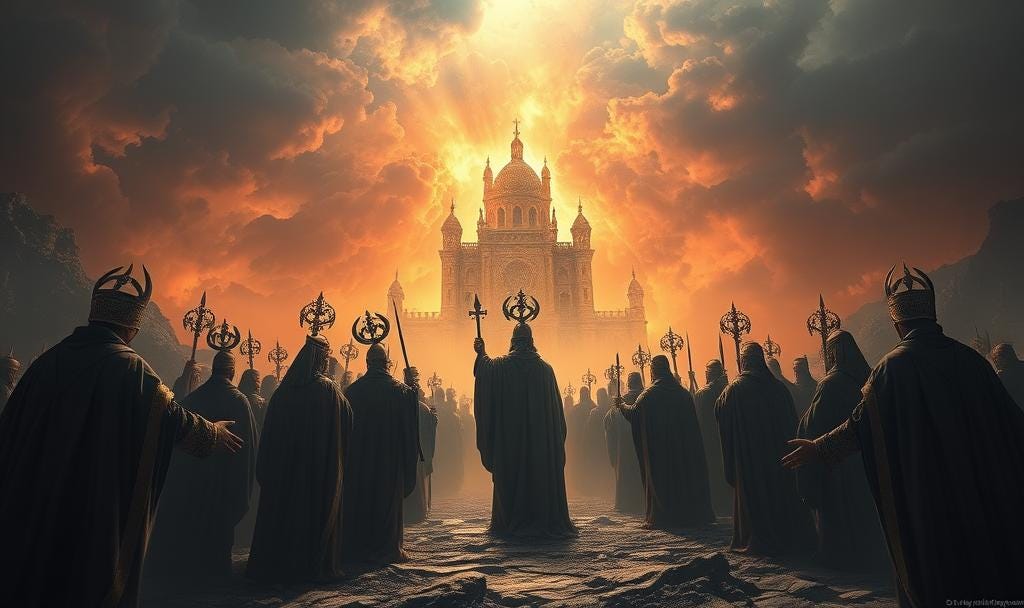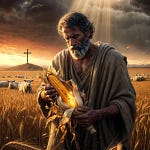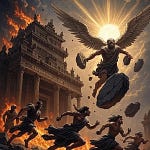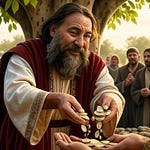
The Second Sunday After Easter
Psalm 150; Hebrews 9:15-23; Revelation 1:4-8; John 20:19-31
You can also subscribe to this podcast on Apple, Spotify, or YouTube.
I.
People often ask me if I think we are living in the “end times.”
Last week, after the death of Pope Francis, an old prophecy, likely a Renaissance forgery, has been making the rounds.
This so-called prophecy was published in 1595 and attributed to St. Malachy, a 12th-Century Irish archbishop.
The prophecy is notorious, because it only lists 112 popes, after which Rome is destroyed. Depending on how you count it, the late Pope Francis was either the 111th or the 112th pope. Now, rumors are flying that the world will end in 2027.
Since we will be reading selections from the Book of Revelation over the next few weeks, I think it will be helpful to focus on these selections in my preaching.
I won’t spend any time on the specious “prophecy of the popes.” We have an inspired prophecy in the Book of Revelation, and, because the word of God is also infallible, we will confine ourselves to understanding this book and what it has to say.
The two questions I want to answer in today’s sermon are, first, are we living in the end times, and second, do we need to be thinking about some kind of “Plan B” or escape plan if we are?
II.
Revelation is a book about God and Jesus Christ, or the God-Christ.
Now, the expression “God-Christ” is an awkward one, but so is John’s Greek in general.
For instance, verse 4 reads in nice Revised Standard Version English, “Grace to you and peace from him who is and who was and who is to come,” but the Greek reads more like, “Grace to you and peace from the Being and the Was and the Coming.”
In sentences like these John is writing down the building blocks of what later became the doctrine of the Trinity. “Father, Son, and Holy Spirit” rolls so easily off our tongues that we forget that it took a while for the Church to get there.
Revelation was written sometime towards the end of the first century.
The phrase “God-Christ” doesn’t appear in the text, but that’s what John is saying. God is at work in the world through His Son.
“Grace to you and peace from him who is and who was and who is to come, and from the seven spirits who are before his throne, and from Jesus Christ the faithful witness, the first-born of the dead, and the ruler of kings on earth.”
“Who is and who was and who is to come” means that God rules over all time, all history.
“…and from Jesus Christ” means that God rules over time and in history through His Son, the God-man, Jesus Christ.
This rule is threefold: first, Jesus is a faithful witness, second, He is the first of many to come back from the dead, and third, He is the ruler of kings on earth.
These three titles for Christ mean three things.
First, that Christ bears witness to the truth. There is no moment in human history that lacks a faithful witness to God.
Second, that death is a defeated enemy, though the implications of that are still being worked out. History is not over. We are not looking to escape. Instead, we are to oppose and destroy the culture of death wherever we find it. That may be the work of a lifetime, or of many lifetimes.
The third and final one, “ruler of kings on earth” is overtly political. The plain meaning of the text is that Christ is active in the government of nations. Whenever the Church stands aloof from politics, she distances herself from Christ. Christ’s Church cannot be neutral in matters of State.
The key point of these first few verses of Revelation is that the God-Christ is both God and Christ, and together the Almighty, the Lord of history.
Now, let’s examine a little bit of drama that occurs as John begins his visionary book, since the drama concerns us.
The second part of verse 5 describes Jesus as, “him who loves us and has freed us from our sins by his blood.” That is a basic summary of the gospel, the good news of Jesus Christ.
However, verse 7 brings bad news of judgment upon those who conspired against Jesus and put Him to death.
“Behold, he is coming with the clouds, and every eye will see him, every one who pierced him; and all tribes of the earth will wail on account of him.”
John adds the words “Even so. Amen.” to the end of the verse to emphasize that he is sure this will happen.
John tells us exactly what that will mean: “Everyone will see Him and those who killed Him will wail.”
This raises an important practical question for us: are we living in this final moment, the end of all days? Is He coming on the clouds?
We have a need to know: are we loved by God and will Christ’s coming set us free? Or are we counted among those who will wail?
No one alive is guilty of the specific crime of putting Jesus to death on the cross, but that doesn’t mean our generation is off the hook. Far from it.
As I was working on this sermon, I was participating in the Family Institute of Connecticut’s X Space on the “bad bills” that are pending now in Hartford.
Keeping track of and speaking up about the evil going on around us — and worse, in our name — is the fulfillment of what John says in verse 5-6.
I read the first part to you, “To him who loves us and has freed us from our sins by his blood….”
Here’s the second part: “and made us a kingdom, priests to his God and Father.” I like the King James Version better, “he hath made us kings and priests.”
III.
This means that we Christians are called to consecrate the times in which we live.
We don’t need an escape plan. There is no need to exit history.
I would go further and say that there is no escape plan. We can’t escape history. Jesus is and always was God’s Plan A.
That means that it was always in His mind that wicked men should conspire to destroy Christ, His witness, His life, and His kingdom.
We come up short when we fail to act like the kings and priests that Jesus made us to be.
Now, there is a tie in here between God’s love for us and our willingness to act as kings and priests. He loves us and makes us kings. He frees us from sin by His blood to make us holy priests.
If we are not willing to rule in Christ’s name, then we shouldn’t count on His love. If we are not willing to consecrate the times in which we live, we have no share in the blood which frees us from our sins.
IV.
Christ’s death and resurrection means that death no longer has dominion over Him — or us.
Paul writes in Romans 6:9, “For we know that Christ being raised from the dead will never die again; death no longer has dominion over him.”
But where does that leave us?
Paul continues in Romans 6, “if we have died with Christ, we believe that we shall also live with him… For he who has died is freed from sin.”
But His death does something else. It unseals His Last Will and Testament. We call it the New Testament, and, like any will, it is full of promises to the heirs.
We read in Hebrews this morning, “a will takes effect only at death, since it is not in force as long as the one who made it is alive.”
That is one of the main actions in the Book of Revelation, the seals on the New Testament are broken. The book is opened and the will of God for the ages, including our own, is revealed.
In Revelation 5:2, John sees “a strong angel proclaiming with a loud voice, ‘Who is worthy to open the scroll and break its seals?’”
Why do the seals need to be broken? So that this last will, which is the New Testament, can be read. So that God’s Church can inherit all the promises that were made to her while she was coming of age under the law of the Old.
V.
Now, let us come back and answer the question, “Are we living in the end times?” and deal with the implications of the answer.
I have already said that there is no Plan B, no escape from history. Rather, as kings, we are to rule with Christ in history. Ruling with Christ in history means that as kings and priests we are to consecrate the political process.
Let me say that again: “Ruling with Christ in history means that as kings and priests we are to consecrate the political process.”
There are two roles here, king and priest. Theologians and constitutional scholars like to try to separate the two. “Separation of Church and State” is not a phrase that’s found in the Constitution, but it has become the popular interpretation of the First Amendment.
But you don’t find this separation in the Bible. In fact, the whole purpose of Christ is to make sure the two work together. Again, the King James Version makes it clear, “he hath made us kings and priests.”
Let’s look at these two roles, kings and priests.
Kings. A kingdom is a political or territorial unit. As we continue our study of Revelation this Easter season, we will see that the political power and physical territory held by Satan is being broken up and recaptured by Jesus Christ through the power of His resurrection.
This is Reconquista on a cosmic scale. It means nothing less than the recreation of the world around us, a new heaven and a new earth.
Priests. Essential to this kingdom building is the power to determine what is allowed in and what must be kept out. This is called the “power of the keys,” and these keys are entrusted by Jesus to His Church, to His “kingdom of priests.”
In Matthew 18:18 Jesus says, “Truly, I say to you, whatever you bind on earth shall be bound in heaven, and whatever you loose on earth shall be loosed in heaven.”
When Christians organize politically it is to exercise the power of the keys. Jesus expects us to “bind and loose” at the local, state, and federal level.
Now, I mentioned the “bad bills” pending in Hartford before, but I want to focus on one in particular, HB 7213.
Section 19-13-D54 of the Regulations of Connecticut State has two important sub paragraphs regulating abortion that could be repealed as early as tomorrow.
Here’s what those paragraphs say.
Paragraph (f) reads, “No person shall be required to participate in any phase of an abortion that violates the provider’s judgment, philosophical, moral or religious beliefs.” Makes sense, right?
Paragraph (g) reads, “If the newborn shows signs of life following an abortion, those appropriate measures used [to] support life in a premature infant shall be employed.” That’s the least we can do, right?
The thing is, HB 7213 would repeal 19-13-D54 entirely. That means no more conscience clause, no more requirement to save children born alive.
What’s worse is that according to Family Institute of Connecticut’s Peter Wolfgang, Connecticut’s Democrats changed the language of HB 7213 after the public hearings were over.
That means that Connecticut’s doctors and nurses never got to comment on a change to the law that would require them to participate in abortions.
Luke 12:3, “Therefore whatever you have said in the dark shall be heard in the light, and what you have whispered in private rooms shall be proclaimed upon the housetops.”
What else is being done in secret — and in your name — up in Hartford?
It’s time for you kings and priests to start asking some tough questions.
People will say a pastor shouldn’t preach politics from the pulpit. But if the government silences the people, then the pulpit must speak.
But Hartford isn’t the only arena in which to contend.
This week, for instance, you could attend with me the meeting of the Planning & Zoning Commission in Terryville, to show support to Pastor David Townsley of Riverside Baptist Church.
Pastor Townsley is waging a lonely battle to shut down the swingers’ club that is operating illegally and within 1000 feet of his church. That’s at 7 PM on Tuesday, April 29, at 80 Main Street, Terryville, Connecticut. (More information here.)
As a kingdom of priests, the Church is called to say, “No, we will not have swingers’ clubs in our towns.” We bind them and cast them out, because they do not belong in the kingdom that is coming.
We do the same with our families too. We bind the evil that seeks to enter our homes, and not just our homes, but the homes of our neighbors. Satan has no right to private association.
I will say that again, “Satan has no right to private association.” Let the implications of that sink in.
Satan has no right to private association with your wife. Satan has no right to private association with your husband.
Satan has no right to a private association with you and your phone. He has no right to a private association in clubs, in the lodges, in the chambers of commerce, or in the churches who refuse to preach the whole counsel of God.
Each one of you is a priest with the vested authority of Christ to bind Satan at every turn and to cast him out of your midst.
As kings, no authority on earth can legitimately tell you that you cannot exercise your priestly office.
These earthly powers will most certainly try to stop you. They will harass you. They will shame you. They will cancel you. They will swat you. They will call you all kinds of names. They will get you fired. They will put you in jail. They may even kill you.
But, no matter what they do, you will still be kings and priests.
Every king with his crown is willing to die for his kingdom and every priest is willing to be sacrificed on his altar.
You are a priest. Keep yourself holy.
You are a king. Do not let the scepter fall from your hand.
This is the fighting spirit that John’s revelation kindled in the early Church.
This is the spirit that flamed like Roman torches as burning martyrs lined the way to the Colosseum. This is the spirit that faced down hungry lions. This is the spirit that bent Caesar to His will.
This is the spirit that sparked the Protestant Reformation. This is the spirit that landed on these shores and founded this church.
This is the Spirit that is and was and is coming into the world.
So, back to the original question this sermon set out to answer. Are we living in the “end times”? Will the world end sometime during the reign of the next pope?
It should be clear that the answer to the second question is unknown and unknowable. Jesus says, “Watch therefore, for you know neither the day nor the hour.”
A silly prophecy — and I do believe that’s what it is, silly — from the 16th century, and purporting to be even older than that, tying the end of the world to the line of Roman popes, is full of institutional vanity and pride. Don’t pay any attention to it.
If the world ends and Jesus returns, be sure that He finds you at work building His kingdom. That means, make sure you wake up every day and be about the business of ruling and consecrating.
You are fortunate to live in a country that still gives a large measure of political power to the people. You can thank the Protestant Reformed Congregationalist heritage of this church and others like it for that. Don’t neglect it.
But yes, we are living in the end times. This is the last age of the old world, the old kingdom, the old king, and the old religion. Still, many of its strongholds remain.
Paul tells us in 1 Corinthians 15:24, “Then comes the end, when he delivers the kingdom to God the Father after destroying every rule and every authority and power.”
That is the moment we are living in, this moment when Christ, through His Church, through His kings and priests, is “destroying every rule and every authority and power.”
I hope I’ve made it clear what the message of John to the Church in this first chapter of his revelation is.
This destruction of every rule and authority that is opposed to God is not a spectator sport. The Church does not watch on from the bleachers as Christ contends for us.
We should find ourselves in the heat of battle with Him, and, if we don’t, then we must ask ourselves, are we really with Him at all?
Preached on April 27, 2025 at the First Congregational Church, Woodbury, Connecticut.
Questions for reflection and discussion:
How am I actively living out my calling as a ‘king and priest’ in my daily life, and what specific actions can I take to consecrate my community against influences that oppose Christ’s kingdom?
In what ways might I be tempted to seek a ‘Plan B’ or disengage from the challenges of history, and how can I instead trust Christ’s victory over death to embolden my witness?
How can I better recognize and respond to Christ’s active rule as the “ruler of kings on earth” in the political and social arenas around me, ensuring I am not standing aloof from His work?
Download the sermon handout here.











